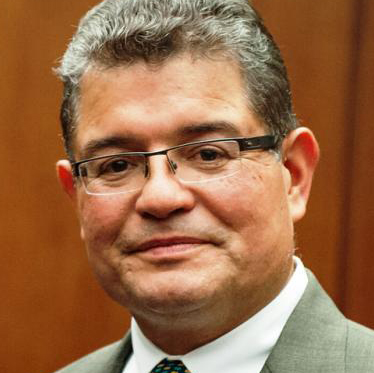Federal judge orders courtroom doors locked before he announces ruling on stash-house stings

Judge Ruben Castillo. Wikimedia Commons.
Chicago’s chief federal judge ensured that spectators didn’t leave his courtroom while he announced Monday that he was “reluctantly” denying a motion to toss the charges against eight people charged in stash-house robbery stings.
U.S. District Chief Judge Ruben Castillo ordered his courtroom doors locked before announcing that the stings are “tinged with racial overtones” but there wasn’t enough evidence to prove they are racially biased, report the Chicago Tribune and the Chicago Sun-Times.
The Tribune says the doors were locked so spectators wouldn’t “rush out” in the middle of his remarks. The Sun-Times says the locked doors were intended to avoid the distraction of people leaving and entering the courtroom.
Stash-house stings are set up by the U.S. Bureau of Alcohol, Tobacco, Firearms and Explosives. Typically a confidential informant is recruited to tell friends and associates about places with large amounts of drugs that could be robbed. Robbery crews are organized, and arrests are made.
Castillo’s decision followed an unusual joint December hearing in which he and eight other federal judges with stash-house cases heard statistical evidence on alleged racial bias. The other judges have yet to issue their decisions.
Forty-three men are awaiting resolution of their cases; all have been offered plea deals.
During the December hearing, an expert in police practices testified that his review of 24 stings between 2006 and 2013 found that 74 out of 94 defendants were black. The expert, Columbia law professor Jeffrey Fagan, said there was “a zero percent likelihood” that chance explained the racial disparities.
A prosecution expert countered that Fagan had used too broad of a control group to compare with the sting defendants, and it consisted of people who weren’t comparable to the people charged in the stash house cases.
Castillo said the cases “are deeply troubling” and the statistics “generate great disrespect for law enforcement efforts.”
“Fortunately for the government, the question before this court is not whether the practices used in these sting operations are honorable or fair,” he wrote. “The court concludes that defendants have failed to meet the heavy burden that currently must be satisfied to obtain dismissal of a federal criminal indictment.”
Castillo called for an end to such stings. “It is time for these false stash-house cases to end and be relegated to the dark corridors of our past,” he wrote.



